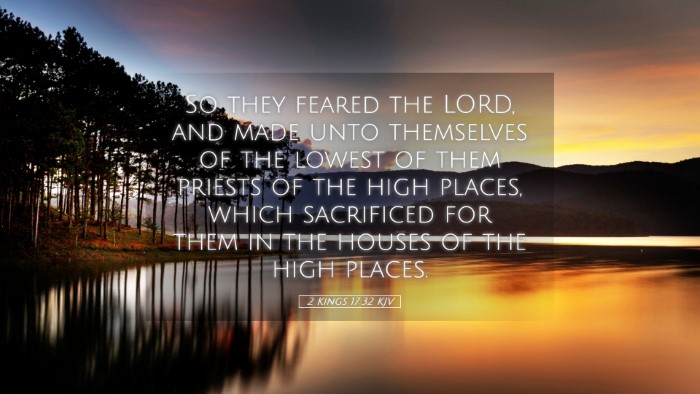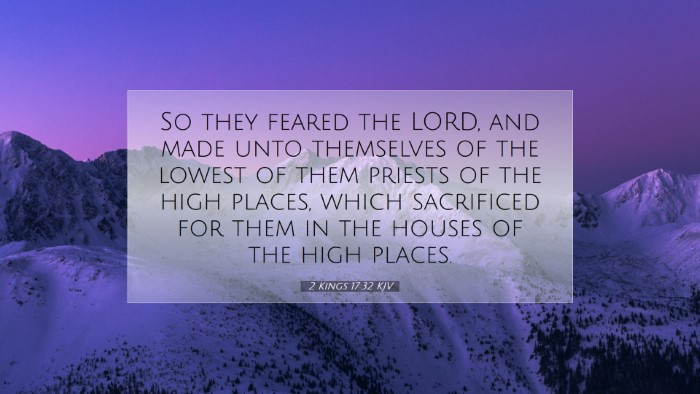Commentary on 2 Kings 17:32
Verse: "So they feared the LORD, and made unto themselves of the lowest of them priests of the high places, which sacrificed for them in the houses of the high places."
Introduction
This verse serves as a pivotal moment in the historical narrative of 2 Kings, reflecting the complexities of Israel's spirituality post-exile. It describes the actions of the Samaritans, who, after the Assyrian conquest, adopted a syncretistic form of worship, attempting to blend their existing pagan practices with the worship of Yahweh. Such a mix illustrates the broader themes of fear, reverence, and misguided religious practices prevalent in ancient Israel.
Contextual Analysis
The context of 2 Kings 17 centers around the political and religious upheaval experienced by the Northern Kingdom of Israel. Following the fall of Samaria, the introduction of foreign inhabitants by the Assyrians led to a mingling of cultures and religions. The verse captures how the fear of the LORD was superficial and intertwined with the local worship of pagan deities.
- Historical Background:
The Assyrian policy of repopulation led to the introduction of various gods into Israel, resulting in a religious syncretism that significantly affected the spiritual integrity of the Israelites.
- Religious Practices:
It is essential to understand that fear of the LORD in this context does not denote genuine reverence but rather a form of superstition and partial acknowledgment of God amidst other religious practices.
Thematic Insights
This verse encapsulates the theme of divided loyalty, often highlighted in biblical texts, where adherence to God is compromised by surrounding influences.
- Fear of the LORD:
The phrase "feared the LORD" indicates a recognition of God's power but fails to translate into true worship. This reflects a profound misunderstanding of what it means to honor God in spirit and truth.
- Priests of the High Places:
The choice to select from the "lowest of them" as priests underscores a rejection of legitimate Levitical worship. This not only highlights the degradation of religious standards but also the desperation to maintain some form of worship in a chaotic spiritual environment.
Commentary Extracts
Insights from Matthew Henry
Matthew Henry emphasizes that the fear of the LORD among the Samaritans was mere formality. He asserts that while they acknowledged God’s authority, their actions demonstrated a serious compromise of faith. He notes, "They were not heartily devoted to God, nor did they rightly understand His will, for they mixed profaneness with true worship."
Insights from Albert Barnes
Albert Barnes points out the irregularity of appointing priests from among common individuals. He criticizes the established order of worship and notes that the resultant sacrifices were not sanctioned by the Law. "It is a significant indication of the decay of true piety when worshippers would rather choose convenience than authentic priests," he reflects.
Insights from Adam Clarke
Adam Clarke observes the juxtaposition of fear and false worship. He highlights the dangers of mixing sacred practices with idolatrous ones, which leads inevitably to corruption of faith. Clarke states, "Fear without knowledge and obedience cannot lead to genuine obedience; it is merely an echo of superstition devoid of substance."
Pastoral Application
For pastors and spiritual leaders today, this verse serves as a cautionary tale about the nature of worship and the integrity of leadership. It challenges modern congregations to examine their practices and ask whether they are genuinely honoring God or simply adapting to cultural norms.
- Call to Authentic Worship:
The call for authentic worship is timely; congregations must focus not on surface-level spirituality but on a transformative relationship with God.
- Loyalty in Leadership:
Leaders should strive to lead by example, ensuring that their actions and teachings reflect a sincere commitment to biblical principles, rather than a compromise with popular ideologies.
Theological Reflections
This passage invites deep theological reflection regarding the nature of divine worship. It exemplifies the perennial struggle between faithfulness to God and the allure of external practices. The challenge remains for today’s believers to engage with the essence of worship and to understand that true reverence cannot coexist with spiritual syncretism.
- Understanding God’s Demand:
God’s demand for righteousness is unequivocal, and this verse serves as a reminder of the imperfections that can arise when His people blend their faith with external influences.
- Implications for Evangelism:
As scholars and theologians, understanding this dynamic is crucial for approaching evangelism and discipleship, which should emphasize not only knowledge but also the necessity of absolute loyalty to Christ.
Conclusion
2 Kings 17:32 encapsulates a significant moment of biblical history, reflecting the profound results of syncretism in worship. By acknowledging the fears and practices of the Samaritans, we glean valuable lessons about the importance of true devotion to God, the role of leadership in spiritual integrity, and the necessity of aligning our worship with divine revelation. In our modern context, let this verse challenge us to pursue authentic faith, rejecting all forms of idolatry and understanding that genuine worship is borne from a heart fully surrendered to God.


